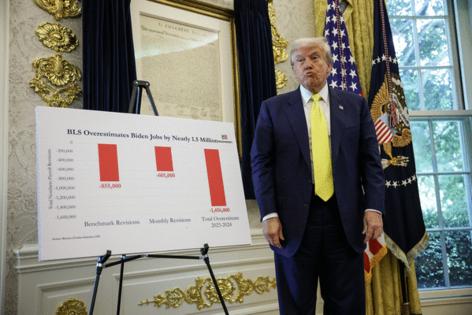Editorial: Trusted data is a vital economic asset
Published in Op Eds
Without access to data that’s both objective and seen to be objective, financial markets and government policy are dangerously compromised.
So alarm over the recent firing of Bureau of Labor Statistics Commissioner Erika McEntarfer and the nomination of EJ Antoni, chief economist of the conservative Heritage Foundation, to succeed her is entirely warranted. In its own interests, as well as for the sake of the economy, the White House needs to contain the damage these decisions have caused.
The purported reason for removing McEntarfer was that the bureau’s latest release on hirings — a first estimate for July and updated numbers for May and June — had been rigged to make the administration look bad.
The downward revisions to the earlier months were unusually big, to be sure, highlighting legitimate questions about the bureau’s methods and how to improve them. But these are difficult and long-standing technical challenges. There is no reason whatsoever to suspect the integrity of its chief, who is widely respected, or her staff.
Worse, Antoni’s nomination cements the idea that this position should be a partisan appointment, changed with each new administration — and that a thumb on the scale is appropriate so long as it pushes the right way.
In so many words, this tells financial markets that official statistics are no longer to be trusted. Regardless of which party is in control, they should expect employment to be nudged higher and inflation lower.
The result will be opacity, uncertainty, greater financial risk and (especially) a persistent suspicion that inflation is being understated — all of which will push long-term bond yields higher and add to the cost of borrowing for consumers and producers alike. Presumably, that’s the opposite of what the administration wants. Yet here we are.
More accurate data on jobs and inflation — meaning smaller revisions as new data arrives — is eminently desirable.
Generating it will require more resources and better statistical methods. Neither, to put it mildly, has been a priority. Recent cuts in BLS staffing, partly as a result of the administration’s efforts to slash costs, have hampered the timely collection of data. And earlier this year, Commerce Secretary Howard Lutnick disbanded the Federal Economic Statistics Advisory Committee, a panel of unpaid technical experts tasked with improving data collection and analysis.
Producing accurate measures of jobs and inflation is more complicated than one might think, and it’s especially demanding when the economy is in flux as it is now.
Bearing this in mind, the scale of July’s revisions shouldn’t perhaps have come as a surprise. Don’t expect the picture to grow any clearer soon: The economy is still in the early stages of adapting to the shocks that the administration is dispensing with its tariffs and other policies. The BLS’ job is getting harder, not easier.
It’s a pity the White House didn’t just apologize to McEntarfer and ask her to stay on, promising the bureau the resources it needs to do better, and letting FESAC get back to work.
If Antoni’s appointment is confirmed, he should understand that his arrival has caused real concern and do what he can to allay it by being scrupulously objective in the handling and publication of data.
While that’s unlikely to happen, it’s still essential to restore the presumption that the BLS is not political and to refrain from further undermining its credibility. Failing to do so will hurt a lot more than one bad jobs report does.
_____
©2025 Bloomberg L.P. Visit bloomberg.com/opinion. Distributed by Tribune Content Agency, LLC.
























































Comments